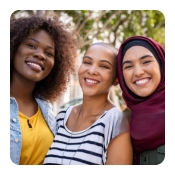Black History Month is a time to re-engage, acknowledge, legitimize, and give ample space for the achievements and experiences of Black Americans and people of African descent. This includes looking at things through the lens of mental health.
Each February, we celebrate Black History Month, which is an opportunity to honor and embrace the achievements of Black Americans in our country. How did this month come to be?
Every year, the Association for the Study of African American Life and History selects a theme for Black History Month. You can explore past themes from 1928 through the present day at this link.
This year’s Black History Month will celebrate the theme of A Century of Black History Commemorations. This theme marks the 100th anniversary of the first Black history observances beginning with Negro History Week in 1926 and celebrates a century of organized remembrance, education, and recognition of Black history’s impact on society and culture. It encourages reflection on how Black history has been documented and commemorated over the past 100 years, and how those commemorations help shape understanding of Black life and contributions in the modern world.
To help the mental health community we have put together a working resource list for engaging Black History Month. While this list is certainly not extensive, it seeks to provide a variety of starting points for embracing Black History Month.
Mental Health Resources
Loveland Foundation: The Loveland Foundation is committed to showing up for communities of color in unique and powerful ways, with a particular focus on Black women and girls.
Therapy For Black Girls: Therapy for Black Girls is an online space dedicated to encouraging the mental wellness of Black women and girls.
- Check out the podcast episode: Some Thoughts on Body Image with Paula Edwards-Gayfield, MA, LPCS, LPC, NCC, CEDS-S.
- Check out the podcast episode: Let’s Chill with the Quarantine 15 Jokes with Gayle Brooks, PhD, CEDS-S
Coffee, Hip Hop, & Mental Health: Their mission is to bring awareness to the importance of mental health, emotional intelligence, and self-awareness to one’s quality of life, particularly in the black community. Their primary service is to provide access to mental health and therapeutic services by removing the financial, systemic, and emotional barriers which prevent healing.
Melanin & Mental Health: Melanin & Mental Health connect individuals with culturally competent clinicians committed to serving the mental health needs of Black & Latinx/Hispanic communities.
Black Emotional and Mental Health (BEAM): BEAM is a national training, movement building, and grant making institution that is dedicated to the healing, wellness, and liberation of Black and marginalized communities.
Mental Health America: Throughout the month, they are highlighting Black and African American contributions to the mental health movement. Also, offering a multitude of resources.
Specific Directories of Therapists
- Black Virtual Therapist Network
- Association of Black Psychologists
- Therapy for Black Girls
- NQTTCN
Books to Read
Many books, written by medical and mental health professions, and/or other members of the Black and African American community may be valuable resources. Here are some of the most helpful:
- It’s Always Been Ours: Rewriting the Story of Black Women’s Bodies by Jessica Wilson MS RD
- The Care and Feeding of Ravenously Hungry Girls by Anissa Gray
- Hunger by Roxanne Gay
- Not All Black Girls Know How to Eat: A Story of Bulimia by Stephanie Covington Armstrong
- The Body is Not an Apology by Sonya Renee Taylor
- Fearing The Black Body by Sabrina Strings
- Treating Black Women with Eating Disorders: A Clinician’s Guide by Charlynn Small and Mazella Fuller
- Belly of the Beast: The Politics of Anti-Fatness as Anti-Blackness by Da’Shaun L. Harrison
- Unashamed: Musings of a Fat, Black Muslim by Leah Vernon
- Black Women with Eating Disorders by Charlynn Small and Paula Edwards-Gayfield
Buy these from Black-owned bookstores!
Renfrew-Specific Podcasts
- Renfrew Conference Mini-Series Episode 4: Our Hair, Our Heads, & Our Hearts: Hair Stories & Eating Disorder Recovery, Part 2
- Episode 9: Let’s Get ‘Comfortably Uncomfortable’: Cultural Humility in Eating Disorder Treatment with Paula Edwards-Gayfield
- Episode 53: A Journey Towards Positive Body Relationships: The Story of Holistic Wellness with Instagram Influencer, Ivy Felicia
- Episode 48: Beating Bulimia: The Riveting Recovery Story of Stephanie Covington Armstrong
- Episode 76: Black Women with Eating Disorders: Cultural Humility & Clinical Care with Paula Edwards-Gayfield, LCMHCS, LPC, CEDS-S
Virtual Support Group
BIPOC Support Group
Meets on the 2nd and 4th Monday of each month.
6:00 pm – 6:45 pm (ET) • Ages 18+
This virtual support group supports BIPOC individuals experiencing disordered eating or questioning whether they have an eating disorder. Participants explore how cultural identity and current social stressors impact recovery while gaining tools for ongoing healing.
Have a resource to share with us? Contact [email protected] to let us know!




